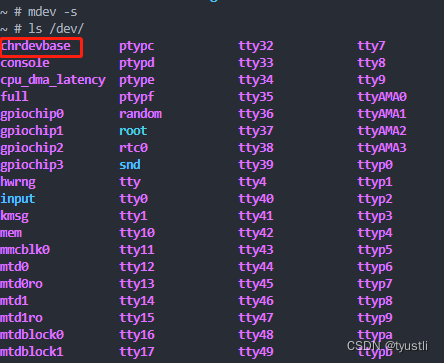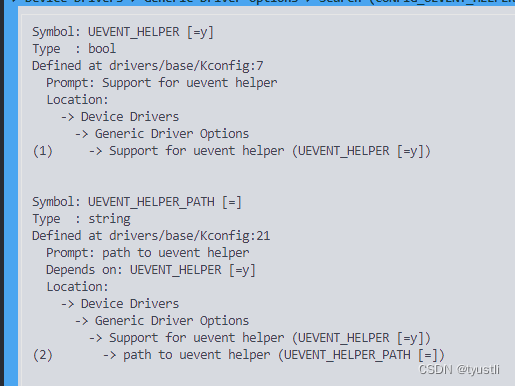linux 驱动——字符设备驱动(自动生成设备节点文件)-CSDN博客
| 阿里云国内75折 回扣 微信号:monov8 |
| 阿里云国际,腾讯云国际,低至75折。AWS 93折 免费开户实名账号 代冲值 优惠多多 微信号:monov8 飞机:@monov6 |
文章目录
linux 驱动——字符设备驱动
linux 驱动——字符设备驱动(自动生成设备节点文件)
linux 驱动——将模块编译进内核
字符设备驱动
#include "linux/device/class.h"
#include "linux/export.h"
#include "linux/uaccess.h"
#include <linux/types.h>
#include <linux/kernel.h>
#include <linux/init.h>
#include <linux/module.h>
#include <linux/fs.h>
#include <linux/device.h>
#include <linux/cdev.h>
#define CHRDEVBASE_NAME "chrdevbase" /* 设备名 */
#define CHRDEVBASE_NUM 1 /* 设备数目 */
static char write_buf[100];
static char read_buf[100];
static char *string_test = "kernel data this tyustli test";
typedef struct {
dev_t dev_id; /* 设备号 */
struct cdev c_dev; /* cdev */
struct class *class; /* 类 */
struct device *device; /* 设备 */
int major; /* 主设备号 */
int minor; /* 次设备号 */
} new_chrdev_t;
new_chrdev_t new_chrdev;
static int chrdevbase_open(struct inode *inode, struct file *file)
{
printk("k: chrdevbase open\r\n");
return 0;
}
static ssize_t chrdevbase_read(struct file *file, char __user *buf,
size_t count, loff_t *ppos)
{
unsigned long ret = 0;
printk("k: chrdevbase read\r\n");
memcpy(read_buf, string_test, strlen(string_test));
ret = copy_to_user(buf, read_buf, count);
if (ret == 0) {
printk("k: read data success\r\n");
} else {
printk("k: read data failed ret = %ld\r\n", ret);
}
return ret;
}
static ssize_t chrdevbase_write(struct file *file, const char __user *buf,
size_t count, loff_t *ppos)
{
unsigned long ret = 0;
printk("k: chrdevbase write\r\n");
ret = copy_from_user(write_buf, buf, count);
if (ret == 0) {
printk("k: write data success write data is: %s\r\n", write_buf);
} else {
printk("k: write data failed ret = %ld\r\n", ret);
}
return count;
}
static int chrdevbase_release(struct inode *inode, struct file *file)
{
printk("k: chrdevbase release\r\n");
return 0;
}
static struct file_operations chrdevbase_fops = {
.owner = THIS_MODULE,
.open = chrdevbase_open,
.read = chrdevbase_read,
.write = chrdevbase_write,
.release = chrdevbase_release,
};
static int __init chrdevbase_init(void)
{
int err = 0;
err = alloc_chrdev_region(&new_chrdev.dev_id, 0, CHRDEVBASE_NUM,
CHRDEVBASE_NAME);
if (err < 0) {
printk("k: alloc chrdev region failed err = %d\r\n", err);
return -1;
}
/* get major and minor */
new_chrdev.major = MAJOR(new_chrdev.dev_id);
new_chrdev.minor = MINOR(new_chrdev.dev_id);
printk("k: newcheled major=%d,minor=%d\r\n", new_chrdev.major,
new_chrdev.minor);
new_chrdev.c_dev.owner = THIS_MODULE;
cdev_init(&new_chrdev.c_dev, &chrdevbase_fops);
err = cdev_add(&new_chrdev.c_dev, new_chrdev.dev_id, CHRDEVBASE_NUM);
if (err < 0) {
printk("k: cdev add failed err = %d\r\n", err);
goto out;
}
new_chrdev.class = class_create(CHRDEVBASE_NAME);
if (IS_ERR(new_chrdev.class)) {
printk("k: class create failed\r\n");
goto out_cdev;
}
new_chrdev.device = device_create(new_chrdev.class, NULL, new_chrdev.dev_id,
NULL, CHRDEVBASE_NAME);
if (IS_ERR(new_chrdev.device)) {
printk("k: device create failed\r\n");
goto out_class;
}
printk("k: base module init\r\n");
return 0;
out_class:
class_destroy(new_chrdev.class);
out_cdev:
cdev_del(&new_chrdev.c_dev);
out:
unregister_chrdev_region(new_chrdev.dev_id, CHRDEVBASE_NUM);
return err;
}
static void __exit chrdevbase_exit(void)
{
device_destroy(new_chrdev.class, new_chrdev.dev_id);
class_destroy(new_chrdev.class);
cdev_del(&new_chrdev.c_dev);
unregister_chrdev_region(new_chrdev.dev_id, CHRDEVBASE_NUM);
printk("k: base module exit!\r\n");
}
module_init(chrdevbase_init);
module_exit(chrdevbase_exit);
MODULE_LICENSE("GPL");
MODULE_AUTHOR("tyustli");
MODULE_INFO(intree, "Y"); /* loading out-of-tree module taints kernel */
字符设备 APP
#include "stdio.h"
#include "unistd.h"
#include "sys/types.h"
#include "sys/stat.h"
#include "fcntl.h"
#include "stdlib.h"
#include "string.h"
static char usrdata[] = { "user data!" };
int main(int argc, char *argv[])
{
int fd, retvalue;
char *filename;
char readbuf[100], writebuf[100];
if (argc != 3) {
printf("u: error Usage!\r\n");
return -1;
}
filename = argv[1];
/* 打开驱动文件 */
fd = open(filename, O_RDWR);
if (fd < 0) {
printf("u: can't open file %s\r\n", filename);
return -1;
}
/* 从驱动文件读取数据 */
if (atoi(argv[2]) == 1) {
retvalue = read(fd, readbuf, 50);
if (retvalue < 0) {
printf("u: read file %s failed!\r\n", filename);
} else {
/* 读取成功打印出读取成功的数据 */
printf("u: read data:%s\r\n", readbuf);
}
}
/* 向设备驱动写数据 */
if (atoi(argv[2]) == 2) {
memcpy(writebuf, usrdata, sizeof(usrdata));
retvalue = write(fd, writebuf, 50);
if (retvalue < 0) {
printf("u: write file %s failed!\r\n", filename);
}
}
/* 关闭设备 */
retvalue = close(fd);
if (retvalue < 0) {
printf("u: can't close file %s\r\n", filename);
return -1;
}
return 0;
}
生成 dev 节点的原理
dev 目录下的节点不是由驱动本身生成的是由文件系统中的工具 mdev 生成的
当系统启动后加载完内核再去加载文件系统执行文件系统中的脚本脚本会执行 mdev -s 命令(即执行 mdev程序)该命令会去遍历/sys/class下的所有文件寻找所有名为 dev的文件dev文件保存了每个驱动的主设备号、次设备号以及驱动名。
生成设备节点的依赖有两个
- /sys/class 有驱动的节点信息即 dev 文件
- 执行 mdev -s创建 /dev 下的节点
ls /sys/class

这里文件是有的这个时候执行
mdev -s
并查看 /dev/ 目录
ls /dev

可以看到设备节点文件自动创建了
配置内核自动创建设备节点
配置 linux 内核使之自动创建设备节点文件

在内核中 make menuconfig 使能 CONFIG_UEVENT_HELPER

CONFIG_UEVENT_HELPER=y
CONFIG_UEVENT_HELPER_PATH="/sbin/mdev"

模块使用
linux 自动创建设备节点之后就不用手动创建了可以直接查看 /dev 目录下已经生成了设备节点文件
ls /dev
模块安装
modprobe my_module
模块使用
lib/modules/6.5.7+/my_app /dev/chrdevbase 1
| 阿里云国内75折 回扣 微信号:monov8 |
| 阿里云国际,腾讯云国际,低至75折。AWS 93折 免费开户实名账号 代冲值 优惠多多 微信号:monov8 飞机:@monov6 |

